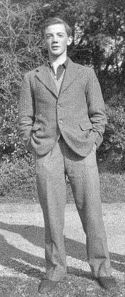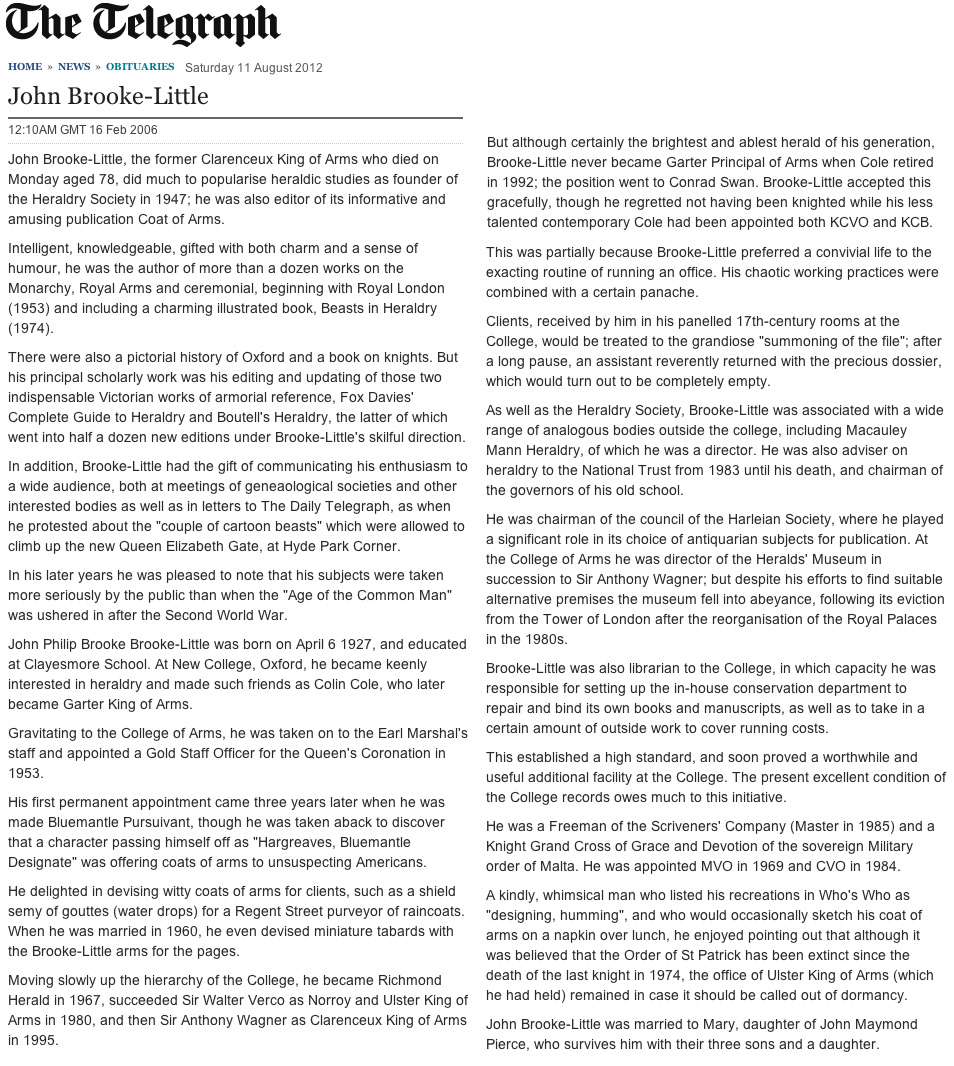
His many publications and deedds are found on his Wikipedia page
John Brooke-Little attended Clayesmore School in Dorset

His many publications and deedds are found on his Wikipedia page
(received via Asher Weill from Mr. Brooke-Little)
I was called up to serve in H.M. Forces at the end of 1945, when the war was all but over. I said that I would like to serve in the Intelligence Corps. I went for my medical and was passed A1. A month later I was told to report for another medical. The same doctor who had previously passed me A1 simply looked at me, standing naked before him and said, "C3 this time old man." I was stunned as this meant I was ineligible for service so I said "Why, what is wrong with me, Sir?" Nothing, my dear chap" replied the doctor "but orders are that everyone is C3 until further advice is received. But never mind, you've got damn fine ankles." A month later I received a letter from a Colonel in the Intelligence Corps thanking me for my offer (that really was the word he used) in the I. Corps and that was that.
My next move was to apply for entrance to Oxford University, specifically at New College. The result was favourable but I was told I would have to wait for about three years owing to the flow of demobilized chaps who naturally were given precedence before the likes of me. What to do while I was waiting to go up?
I opted for politics, as the father of a great friend of mine was the Conservative Party's Area Agent for the South of England. Fortunately he was prepared to help me out and I became a Conservative missionary. That meant being a dog's body to Conservative agents in their constituencies, especially when the seats were "marginal", that is they might go left or right in an election. I was first sent to High Wycombe when Bill (later Viscount) Astor was the candidate.
To cut a long story short, I worked for the Conservative Party for about six months and was then advised to test my teaching abilities (if any) by seeking a job in a Preparatory School, in which junior staff were not usually required to have a university degree. I therefore wrote to two agents for such jobs, namely Gabbitas and Thring and Trueman and Knightly. I was inundated with the details of about sixty schools seeking junior masters. I chose one that I fancied for various personal reasons and wrote to the headmaster. The next day he telephoned me and said "You must be a relation of Raymond Brooke-Little, who was in my house at Marlborough in about 1901" I replied that he was my father and 'snap' the job was mine.
The school was very agreeable to the masters, and, I think, for most of the boys, but I thought I would like to go elsewhere in the following term, as, being a Catholic, a built-in chapel would be a convenience. I picked one where the headmaster and owner was an aristocrat with great charm and a mordant wit. I am still friendly with his descendants, at least one of whom is a fellow Knight of the Sovereign Military Order of Malta.
Now was faced with the summer term. Should I be idle, go and visit relations in Paris, brush up my German in the sad remains of Berlin or what? In September I was due to start reading for my degree at Oxford. I opted for safety, as I knew that I would need a degree.
This time the agents came up with a vacancy in a preparatory school in Sussex, a county unknown to me at the time, called Wisborough Lodge. I applied and the somewhat uncharismatic headmaster and owner of the school offered me the job. Thus I started the summer term in the bungalow which was an annex to the Victorian main building and close to that which housed most of the class rooms and the teachers' common rooms.
I honestly cannot remember the staff very well. There was a Colonel Kennedy, an ancient officer of the First World War. He was granted "early retirement." The headmaster (Macdonald) had not taken proper references for those he employed. Then there was "Jumbo" Edwards, an overweight and rather pathetic fellow, but perfectly agreeable and who taught Latin and could often be heard addressing his class as "you silly buggers." This was probably correct but called for the obvious question from a member of his class: "Sir, please, what is a bugger?" evoking the equally obvious response, "Look in the mirror, you stupid little shit!" No response from the boy who knew the next move was to be sent to the headmaster for a painful interview. But Edwards was a jolly enough fellow when off the subject of boys and we spent many a pleasant evening at the local village pub which was an easy walk from the school.
My principal physical recreation was playing as a wing three-quarter for the Horsham Town Rugby Club and taking the under-matron (an attractive girl of about my age) for walks which usually ended up on an almost demolished hay-stack. She married and later I met her brother, who was at Lincoln College, Oxford when I was at New College.
My chief recollection of the three months I spent at Wisborough was a horrendous car crash which happened just opposite my bedroom in the bungalow. I was thinking of going to bed at about 11 p.m. when there was a fearful crash on the road opposite my window. I looked out and saw that a car had crashed and turned over on the bend, so I sped out and was confronted with chaos and also a severely wounded girl on the road. I went to her and just put my hands under her bleeding head. She breathed for no more than a few minutes and then died. As far as I can recollect the others who were in the car lived but some were badly injured.
Other memories of Wisborough were more enjoyable and I hope were enjoyed by the boys as well. I liked taking them for rambles in the delightfully varied Sussex countryside. There were open fields, woods, streams and all the pleasures of an undeveloped area and I, and I believe the boys, loved rambling, swimming over streams, hiding and all the other pleasures which many of them had not been used to, either at school or at home.
If my brief teaching career taught me anything, it is that a school is as good as its headmaster makes it and this explains why so many state schools today are frequently so pathetically awful; the head of the school often does not know nor even try to know, in the fullest sense of the word, his pupils.
John Brooke-Little
Bicester, Oxon
8 September 2004
I and a diminishing group of fellow pupils, who, in the late 1940s, studied
at an obscure prep school in Sussex called Wisborough Lodge (long defunct),
were saddened to read the obituary of John Brooke-Little, the former Clarenceaux
King of Arms.
Brooke-Little came to the school as an assistant master for just a few terms
during 1948. He was only ten years or so older than most of us boys, but
he left a remarkable impression which has not faded nearly 60 years later.
An English boarding school just after the war was not the warmest and friendliest
of environments, but one of the reasons why not all the memories of eleven
year-old school boys are negative - was John Brooke-Little. A scholar and
a gentleman, charismatic and charming, he was a born teacher who could make
any topic interesting. Undoubtedly he could, should he have chosen to, made
a brilliant and inspirational lifelong teacher, but rather he chose to devote
his life to heraldry. He instilled in many of us an interest in the subject
which has lasted to this day.
After leaving school, we remained in touch when he carried out a piece of
genealogical research for my family. Then, in 2004, I renewed the contact
and I am glad to say that he was able to contribute his 60 year-old recollections
of the school which can now be read on the Wisborough Lodge website.
Whether teaching English literature, introducing us to the arcane subject
of heraldry, going on nature rambles or swimming in a nearby weir, Brooke-Little,
with his sense of fun, and impish sense of humour leavened with a particularly
English touch of eccentricity, left an indelible mark on his pupils who
will continue to remember him with affection, gratitude and respect.
Anthony Weill
Jerusalem
Anthony (Asher) Weill had written earlier:-
"But the jewel in the crown of the teaching staff- and one of the main reasons why not all my WL school memories are negative - was John Brooke-Little. A scholar and a gentleman - charismatic, charming, a born and brilliant teacher who could make any topic interesting - such teachers are as rare as hen's teeth. He was born in 1927 so he was only 20 or 21 at WL! He instilled in me a lifetime interest both in English literature - and in heraldry. In fact, under his guidance, I painted an enormous heraldic genealogical table of the kings and queens of England - an undertaking which won me the first prize (the boys voting) in a school art competition - much to the Macdonalds' annoyance who had no hesitation in telling me that I didn't deserve it. Brooke-Little and my family kept in touch after he had left the drudgery of prep-school teaching (he carried out a genealogical research project for our family) and I still have a copy of his book "An Heraldic Alphabet." I last heard from him in 1987 when he was Norroy and Ulster King of Arms, and feel guilty for not having contacted him since."
P.O.Box 7705, Jerusalem 91076, Israel
John Brooke-Little was an assistant master at Wisborough Lodge for only a few terms, during the 1948 school year. Yet during that brief sojourn, when he himself can have been no more than 21, he made a mark so indelible that those of us who were at the school during his time still remember him with huge fondness, almost sixty years later. Perhaps because he was himself so young, he had a very rare ability to inspire affection and respect from his pupils. He introduced me to heraldry, and for a few years I spent many hours drawing and painting coats of arms. He was quite simply one of the two or three most inspirational schoolmasters in my entire education.
With best regards
Stephen Harvey
Rob wrote:-
Mr. Brooke-Little was the master who inspired most hero worship in my time. He was a breath of fresh air, literally; he took us (out of school grounds!) on wide games like flag-raiding in the fields and dells and once a paper-chase through the fields and woods around Wisborough. But all too soon, he left the school. He confirmed, somewhat unwillingly, the rumour that he was a count. It was of some African place where he had been during the war, I think. Stephen mentioned his interest in heraldry... and I recall that it was Brooke-Little who taught me all I ever learned about it, the terminology, permissible symbols etc. Some boys got very keen, inventing their own coats of arms (boyishly hopeful of future recognition, knighthoods, lordships etc.?)
John Brooke-Little
(Filed: 16/02/2006)

Further to the obituary on John Brooke-Little published on Thursday 16 February,
Asher Weill sent the following short obit. to them..
17 February 2006
The Editor, The Daily Telegraph
London